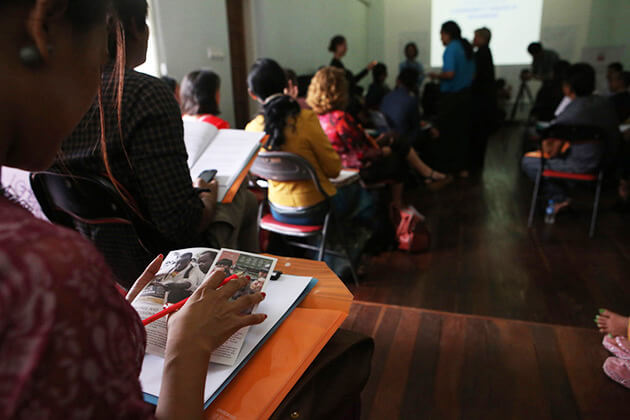
Raising local voices in rural Myanmar
Community radios can help raise the voices of marginalised groups in society. In Myanmar, where they are virtually non-existent, IMS is hosting a series of workshops on the issue
International Media Support hosted the first workshop in late July. The workshops aim to raise discussion about the lack of community radios in the country and are organised in collaboration with Fojo Media Institute, Deutsche Welle Akademie and UNDP Myanmar.
Myanmar’s radio scene is dominated by state managed media, the military and a few private, national FM channels. Although some of them have national reach and some have begun broadcasting in local languages, very few cater to specific communities.
By amplifying local voices, community radio can reinforce democracy, support citizen participation and improve transparency in governance.
The first out of several workshops was conducted in Yangon on 24 July 2015. It was carried out by six facilitators with comprehensive experience in community radio and other parts of the media sector.
“We’re looking to kick-start a process of reflection and increased understanding and knowledge among core stakeholders around the future of community radio,” said Birgitte Jallov, the principal facilitator of the workshop.
Myanmar’s first ever democratically oriented broadcasting law was passed in August, which provides the legal framework for community radio. Before it can become operational, the required implementing bodies need to be set up and a regulatory framework has to be in place, says Birgitte Jallov.
“While this is expected to take the good part of a year, it will also take a while to prepare Myanmar civil society to move into a new potential role as facilitators of radios owned, managed and produced by the community. The July workshop was a first step in this process – and a very promising one.”

The workshops will cover topics such as women and youth involvement in radios, broadcasting techniques, organisational management, strategic planning and fundraising with donors.
The workshops will also focus on building partnerships and national networks, and understandings with parliamentarians and media groups.
More than 50 participants from different organisations attended the first workshop, including reporters and youth activists.
“Community radio is a proven and simple instrument to give voice to local communities,” says IMS Myanmar Project Coordinator Glen Swanson. He emphasises the importance of ensuring local ownership.
“If community radios are not set up correctly, they risk evolving into something other than what was intended,” he says.
The workshops aim at giving participants a dynamic first introduction to community radios.
“Together, we hope to build an understanding of the concept of community radio. This understanding will contribute to a stronger civil society engagement in building community radios in rural areas of Myanmar,” Glen Swanson continues.
The community radio sector in South Asia is nearly as diverse as the region itself. According to AMARC, an international NGO that supports the development of community radio, the sector faces several challenges that need to be addressed. These challenges include restrictive policy frameworks, inadequate allocation of spectrum for communities and the lack of sustainable support systems.




